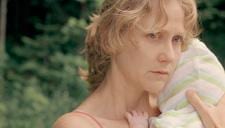“Infant dies in mother’s suicide bid. Leaps in front of subway carrying six-month-old boy: 37-year-old psychotherapist from affluent district in Toronto in critical condition.” Deeply moved by this tragedy and other stories like it filmmaker Rodrigue Jean, of Full Blast and Yellowknife fame, completes his Acadian tri-logy with Lost Song, a story of a woman’s postpartum depression. Winner of the best Canadian feature at last year’s Toronto International Film Festival, Lost Song asks the question, “How could she do it?” Why would a bourgeois woman who seemingly has everything descend to such an act of desperation?
Pierre (Patrick Goyette) and Elizabeth (Suzie LeBlanc) are a seemingly perfect couple; wealthy, accomplished and with a new beautiful baby, they move to the country for the summer. Elizabeth is a successful opera singer, tired after having a baby and a difficult delivery, and seemingly just wants to rest. Pierre is soon off to work and she is left alone, isolated in the country with a dominant mother-in-law. Her only respite seems to be the young teenager Naomi with whom she forms an unlikely friendship, sharing cigarettes and languishing in the sun-filled days of a Laurentian summer.
With little dialogue — the film is in French — Lost Song tracks Elizabeth’s descent into depression. In Jean’s words, “The woman is the sane person; she runs away from the life that traps her. The others seem sane but aren’t.” The selfish husband is clueless, unaware of what his wife is going through; communication has broken down. “Her reaction to the unfolding of her life becomes really the most understandable action in the whole thing,” says Jean.
When writing the script Jean was interested in the Greek myth of Medea, a queen and wife wronged in love and dignity who kills her children. Jean say his interest “was in the destructive nature of love [and I] wondered how this myth would transfer into today’s world of materialism. How would the couple who has everything, and now even a child, have life start to unfold and fall apart?”
Lost Song is a compelling, brilliant film, intense to watch and at times difficult to listen to as the baby crying is key to the sound design. The slow pacing and growing tension envelops the viewer, creating an atmosphere of claustrophobia. The cinematography beautifully captures the internal struggle of Elizabeth. The idyllic setting slowly becomes more and more claustrophobic, a prison that has to be escaped.
Lost Song is not queer in the everyday sense, although it could be seen as a negative comment on heterosexual domesticity and privilege. As for the two women, Jean feels they don’t understand the attraction between them. “It’s desire before identity.” As for being gay himself, Jean says, “I’ve always been interested in where desire is forming. I’ve never made the bridge from me and what I represent to my films. There is nothing hidden but I am not interested in necessarily reflecting myself.”
Jean’s next project is Man for Sale, a film about young male prostitutes in Montreal. “I stayed with them for a year. Many of the sex workers are not homosexuals. I wanted to ask, ‘What is it to have sex and what does it mean?’”
Jean is an intriguing and challenging voice in Canadian cinema, pushing boundaries of what is hidden and what can be revealed. In Lost Song Jean forces us to face real issues around marriage, pregnancy and the conventions that can trap us if communication breaks down, where materialism, what we have, is all there is.

 Why you can trust Xtra
Why you can trust Xtra


